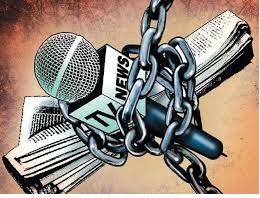By Jamal Mohamoud
The Somali government plans to conduct one-person-one-vote local elections in June 2025, marking a significant milestone in the country’s democratic journey. However, its simultaneous crackdown on civil space raises concerns about the credibility of this electoral process. While elections should be an avenue for broader political participation, restrictive measures such as limiting opposition access to public media, imposing bureaucratic barriers on political gatherings, and curbing press freedom undermine democratic principles. These actions contradict the essence of free and fair elections and cast doubt on the government’s commitment to genuine political competition.
One of the most glaring contradictions is the government’s refusal to allow opposition voices access to state-owned media. Public media should serve as a neutral platform for all political actors, yet the government’s restrictions stifle political discourse and deny citizens the opportunity to engage with diverse perspectives. This control over public narratives creates an environment where the ruling administration can shape electoral discourse unchallenged, ultimately undermining electoral integrity.
Another troubling measure is the requirement for hotels to obtain special permission before hosting political meetings. This policy significantly restricts opposition parties’ ability to mobilize, engage with supporters, and articulate their positions freely. By placing bureaucratic hurdles on political gatherings, the government weakens opposition movements and limits the possibility of a truly competitive electoral process.
On 10 February 2024, in Mogadishu, political parties, including Xisbiga Higsi Qaran, Xisbiga Shacabka, and Xisbiga Nabadda, met at a restaurant known as Mataan to discuss unification and form a single political party. However, government security forces dispersed the gathering, preventing the discussions from taking place. This incident highlights the increasing restrictions on political engagement, as opposition parties are denied the ability to organize and strategize freely. The government’s suppression of such meetings further demonstrates its intent to control the political landscape, reducing opportunities for a competitive and pluralistic democracy.

Concerns over electoral manipulation further exacerbate the situation. The federal parliament received the electoral bill from the Prime Minister on November 6. It approved it by November 22—an unusually swift process that raises questions about whether proper legislative scrutiny occurred. While the expedited timeline suggests the president did not directly interfere, it also indicates a lack of genuine debate and consultation. Similarly, the establishment of the Independent National Electoral and Boundaries Commission followed a rushed and non-transparent process, with allegations that the president handpicked its members. These developments have significantly eroded public trust in the electoral process and cast doubt on the commission’s impartiality.
The government’s approach to constitutional reforms has further fueled skepticism. Earlier in 2024, the president led an effort to amend four chapters of the provisional constitution and signed them into law despite the remaining incomplete chapters. This move was widely criticized for lacking broad consultation and failing to address key governance concerns comprehensively. By unilaterally amending select portions of the constitution, the government has reinforced suspicions that these changes were politically motivated rather than aimed at strengthening Somalia’s constitutional framework. The incomplete nature of these amendments raises concerns about the coherence of Somalia’s constitutional development process and alienates opposition voices who view these reforms as an attempt to consolidate power.
Regional administrations, particularly Puntland and Jubaland, have openly rejected the electoral process, citing its lack of inclusivity and fairness. Puntland opposes constitutional amendments made without broad consultation, while Jubaland insists that elections should not proceed without ensuring an inclusive framework. Their refusal to participate underscores the deep divisions within Somalia’s federal system and highlights the government’s failure to foster consensus. By disregarding the objections of key federal member states, the government risks deepening political tensions and exacerbating regional grievances.
Adding to these concerns is the restriction of independent media and social media. In 2024, journalist Alinur Salaad was detained over military criticism and was forced to remove the content from his social media platform. Such restrictions are often justified on national security grounds or concerns over the spread of politically sensitive content. However, such measures have sparked debates over press freedom and access to information, as many independent news outlets and critical voices face digital blackouts. Limiting access to diverse information sources further undermines the credibility of the electoral process and restricts informed public discourse.
The consequences of this restrictive approach are severe. By limiting civil liberties and sidelining opposition voices, the Somali government is jeopardizing the legitimacy of its democratic reforms. Public trust in the electoral process will diminish, potentially leading to increased political instability and social unrest. The exclusion of key political actors from the electoral framework weakens Somalia’s fragile state-building efforts and prevents progress toward national reconciliation and governance reform. If these issues remain unaddressed, the upcoming elections may entrench authoritarian tendencies rather than advance democracy in Somalia.
Jamal Mohamoud
Email: Jmohamoud702@gmail.com


Leave a Reply